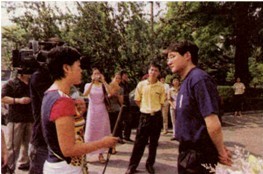人教高中英语高二上UNIT2-1
时间:2018-12-04 作者:英语课 分类:人教高中英语高二

 Newspapers and other media 1 do more than simply record what happens. Experienced 2 editors and reporters make informed decisions about what events to report and how to report them. They also make sure that readers can relate to the stories. We asked two of China's many talented journalists, Chen Ying and Zhu Lin, to tell us more about news and newspapers. The two reporters agreed to switch 3 roles for once and be the interviewees 4 rather than the interviewers 5 in order to let us know about their work and how the news we read is made.
Newspapers and other media 1 do more than simply record what happens. Experienced 2 editors and reporters make informed decisions about what events to report and how to report them. They also make sure that readers can relate to the stories. We asked two of China's many talented journalists, Chen Ying and Zhu Lin, to tell us more about news and newspapers. The two reporters agreed to switch 3 roles for once and be the interviewees 4 rather than the interviewers 5 in order to let us know about their work and how the news we read is made.
Q: How do you decide what you are going to write?
ZHU LIN: Before I decide what I'm going to write, I have to discuss the article with my editor. He listens to my ideas and gives me his suggestions. For long and important articles, for example a feature story, the editor will tell me how I should develop the story. The editor's job is to keep the newspaper balanced and interesting to the readers.
CHEN YING: Much of a reporter's work is done before he or she actually starts writing. A reporter begins by contacting the people to be interviewed and then prepares questions. Interviewing someone is difficult. A reporter must know how to ask the fight questions and how to get people to talk about the topic. After the interview, the reporter must present the material in an organised way and make sure that the article reflects events and opinions truthfully.
Q: Which of the articles that you have written do you like best?
CHEN YING: My favourite article is the one I wrote about the efforts to bring stolen cultural relics 6 back to China. To write this story, I had to contact famous museums around the world and interview both Chinese and international experts in the field. I like the article because it's both news and an interesting story.
ZHU LIN: Even though I have interviewed many famous people, the story I like best is about an ordinary young woman who tried to adapt to her new life after having studied abroad. I like the story because it was the first time that I had written with real passion 7 and because it made me realise 8 that everyone's life is different.
Q: If you could write any article you want, what would you write about and why?
ZHU LIN: I want to explore the mysteries in life. I would like to write about music, art, nature and the importance of spiritual 9 fulfilment.
CHEN YING: I want to write about people you seldom read about, for example people who have AIDS or who are addicted 10 to drugs. Their stories must be told if we want to solve difficult social problems and help those who suffer from them. For a reporter, the basic task is to report an event truthfully. We shouldn't ignore what happens even if it is difficult for people to accept some stories.
The media can often help solve problems and draw attention to situations where help is needed. For example, newspapers like China Daily or The People's Daily help us understand what life is like in other parts of China and the rest of the world. Carefully written articles can help people become interested in important questions around the world. TV programmes and printed articles also help people in other countries learn about China and the Chinese people. The result is a better understanding of the world on all sides, leading to a future world where people from all countries are respected and different views and opinions are tolerated 11.
- The local media reported rioting across the country.当地媒体报道了全国范围的骚乱。
- His latest movie is being hyped up by the media.他新近的电影正被媒体大肆炒作。
- Experienced seamen will advise you about sailing in this weather.有经验的海员会告诉你在这种天气下的航行情况。
- Perhaps you and I had better change over;you are more experienced.也许我们的工作还是对换一下好,你比我更有经验。
- The switch on the wall was beyond the baby's reach.墙上的开关小孩子是够不到的。
- There's been a switch in our plans.我们的计划改变了。
- Interviewer will judge the interviewees attitude by asking the motive of interview. 主持面试的人往往通过了解应聘者应聘的动机来判断应聘者的态度。
- Interviewees range from former CIA agents, to UN weapons inspectors. 受访者有来之CIA特工、联合国武器调查员。
- She ducked the interviewers by sneaking out the back door. 她从后门偷偷溜走,躲开采访者。 来自《简明英汉词典》
- Interviewers quickly learn to pick up non-verbal signals. 采访者很快学会读懂非言语信号。 来自《简明英汉词典》
- The area is a treasure house of archaeological relics. 这个地区是古文物遗迹的宝库。
- Xi'an is an ancient city full of treasures and saintly relics. 西安是一个有很多宝藏和神圣的遗物的古老城市。
- He had a passion for music.他酷爱音乐。
- In his passion,he tore the letter into pieces.在盛怒之下,他把那封信撕得粉碎。
- Wish you realise your dreams as early as possible!祝愿您早日实现自己的梦想!
- How much did you realise on the house?这所房子你们出售后赚了多少钱?
- His spiritual nature is good.他心灵本质上是善良的。
- Their friendship was strictly spiritual.他们的友情完全是精神上的。